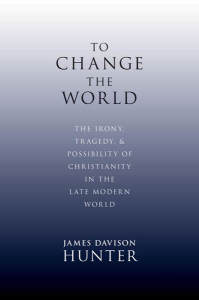This is happening because of this. Next step (without wise remediation) will be this. First step to wise remediation is this.
Enjoy your day!
Joseph Sunde is very kind to me in his post on Acton PowerBlog this morning. I especially appreciated this sentence:
If we cannot agree that politics and economic exchange are ripe spheres for “faithful presence,” in severe need of a Christian liberty that actually sets the captives free, we are missing something significant.
This shows how the two big issues he correctly identifies as central to my critique of To Change the World are connected. One is the category error of separating politics and economics from “culture,” and the other is the need for a more specifically theological and redemptively grounded approach to human culture. As I said in my recent post:
Common grace may or may not have been enough, culturally speaking, for Philemon; Onesimus needed more.

Over on FT, I respond to John Seel’s review of Revisiting Faithful Presence, to which I contributed:
Seel seems determined to portray everything we said in Revisiting Faithful Presence, including not only our criticisms but even our praises, as some kind of vicious attack. He seems determined to believe we have some kind of axe to grind. But we don’t—I certainly don’t—and I trust that any unbiased reader who consults the book will see this. We wrote in a spirit of consideration and discernment, not of defense, attack or any other knee-jerk reaction.
I’ve got a post over on FT on the need to avoid panic, even if (as is not the case) the fate of American civilization really did rest on the outcome of the next election:
The model here is Lincoln. As I said, the survival of our civilization really was immediately impacted by the election of 1860. When Lincoln realized that his election would trigger a crisis that might destroy us, the panic response—the “save our civilization at all costs!” response—would have been to drop out of the race or find a way to make a convincing peace with slavery. But Lincoln knew the crisis couldn’t be averted. He knew the destruction of American civilization was something that had to be risked. He focused on preparing for the crisis and getting ready to rebuild on the other side.
And that is why we are still Americans today.
Bonus: A quick and fun review of the history of hysteria in American consciousness. We’re a people who love to panic, partly because we’re a democracy (the founders warned about this!) and partly because of our commitment to religious freedom. The American experiment in separating confession from constitution leaves us perpetually anxious as to whether there’s a center to our civilization.
I was stunned by David Goldman’s “Parable for Germany“:
Once there was an old man who in his youth committed a terrible crime, the murder of many innocents. He no longer could remember what drove him to do this; he tried not to think about it, and his memories came to mind unwillingly and infrequently. Rage and guilt had faded long ago into a vague residue of disgust. He worked hard and found some distraction in the monotony of daily tasks. He sought diversion in tasteless entertainment…
One day the old man met a street urchin and on an impulse invited him back to his apartment…
Most Europeans, cut off from all transcendence, are hungry for something worth living for. In all the rest of Europe this is driving people to nationalism, which is awful enough. In Germany, the hunger for transcendence is greatest (guilt is always the root cause of this disconnection; where guilt is greatest, the disconnet will be strongest) yet nationalism is not an option in Germany. While everyone else in Europe is asking “how do we preserve our nation?” Germany asks “is our nation worth preserving?” And since Germany remains the root of what European economic vitality remains, this puts the whole continent in an even more precarious position.
I found Goldman’s article through a link from Mark Steyn, whose column on the eclipse of conservatism by nationalism in the U.S. is also well worth your time:
But what is “the Republican Party” in 2015? To a businessman, it looks like an unsellable product and an incompetent management…but with a useful mailing list and a functioning network of branch offices. Why not mount a hostile takeover and relaunch it as something else?
This is exactly what has happened.
Image HT